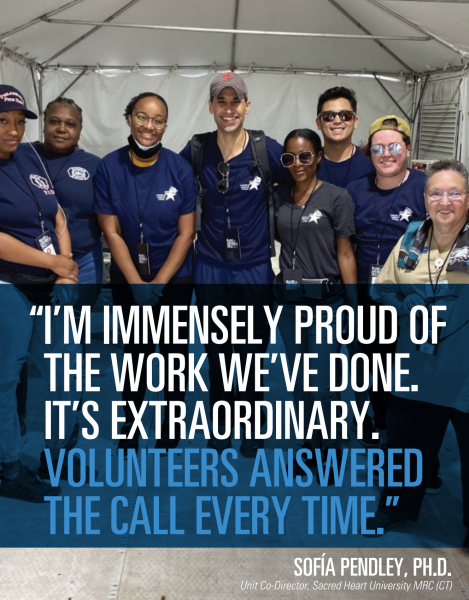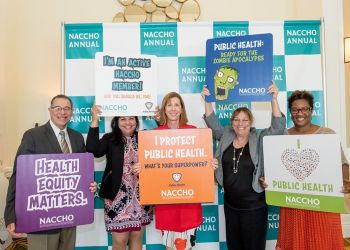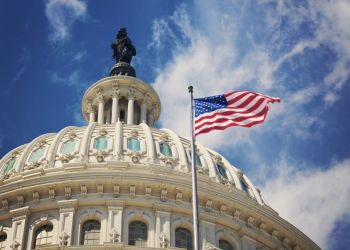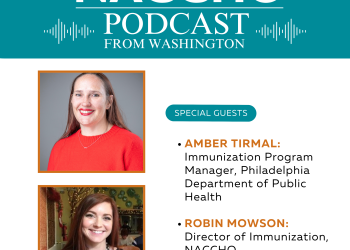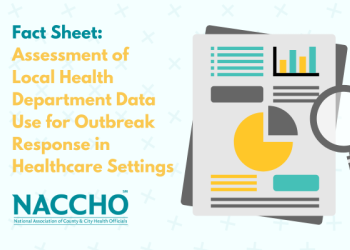Washington, DC, November 20, 2023 – The National Association of County and City Health Officials (NACCHO), the voice of the country’s 3,000 local health departments, has released the 2022 Network Profile of the Medical Reserve Corps (MRC) report, which explores the composition and efforts of the 800 MRC units across the country and provides recommendations for future support of the program (page 40). MRC units are a volunteer organization of local medical and non-medical volunteers who are ready to respond to public health emergencies. The new report shows that MRC volunteers contributed over 1.1 million hours of service across the country in just one year—the equivalent of over 530 full-time employees. However, MRC availability varies by geography and more funding is necessary to build on and expand the network’s resources, reach, staff, and partnerships.
Over its 20-year history, MRC volunteers have responded to communities amidst a range of emerging threats – from COVID-19, the opioid epidemic, active shooter response, natural disasters, and severe weather. MRC units dedicated a total of 1,114,618 volunteer hours to emergency and non-emergency activities with 603,587 hours to COVID-19 in 2022 – equating to an economic value of over $35 million. Throughout the year, volunteers responded to a variety of emergency and non-emergency activities including drive-through testing/vaccination (82%) and mass vaccination points of dispensing (77%) during COVID-19 along with community outreach missions, epidemiology support, and other response capabilities. MRC units provided support through community education trainings, such as Until Help Arrives, Stop the Bleed, CPR and First Aid, and Psychological First Aid (PFA). They also executed personal and family preparedness initiatives, clinics, epidemiology and surveillance services, and environmental and vector control efforts, contributing a total of 443,283 non-emergency hours.
Partnerships continue to be an integral part of support for the MRC, which ensures coordination during responses. More than half of MRC unit respondents say they have strong partnerships with hospital and health systems, fire and EMS, police, and state emergency management, with 70% of units affiliated with their local health departments. However, 43% of MRC units report that they are not receiving any support from local government agencies.
Historically, funding has been a key barrier for starting, maintaining, or expanding MRC units, with 42% reporting that it has impacted recruitment efforts. Due in large part to enhanced funding in supplemental COVID-19 appropriations, staffing improvements were made over the last two years with 27% reporting that “not having enough staff” hindered the effectiveness of response compared to 42% in 2020. Local and state MRC units received $15 million to support temporary staffing levels and expand training opportunities through the NACCHO RISE Award that operationalized funds from the American Rescue Plan Act of 2021 (ARP). However, that was a one-time infusion of funds, and long-term sustainment of funding remains a priority to ensure the readiness of the MRC to support emergency response needs.
“For 20 years the MRC Network of volunteers has consistently demonstrated its unwavering commitment, facilitating the important work of volunteers to respond to community-level disaster and crisis threats,” said Lori Tremmel Freeman, Chief Executive Officer at NACCHO. “They directly benefit neighborhoods and communities by providing vital support to preparedness and response activities locally, while helping to fulfill our national preparedness goals. It is imperative that these key partnerships are strengthened and supported through public policy and increased investments.”
The full report can be viewed here: 2022 MRC Network Profile. NACCHO’s policy statement on the MRC, including additional policy recommendations can be found here: Medical Reserve Corps Policy Statement.
###
About NACCHO
The National Association of County and City Health Officials (NACCHO) represents the country ’s 3,000 local health departments. These city, county, metropolitan, district, and tribal departments work every day to protect and promote health and well-being for all people in their communities. For more information about NACCHO, please visit www.naccho.org.
About the MRC Network Profile Survey
Since 2013, the MRC Network Profile Survey has been conducted periodically to gain an understanding of the Medical Reserve Corps network preparedness and response activities across the U.S. In 2022, the survey was distributed to 744 active unit leaders with a total of 541 units completing the survey (73% response rate).
